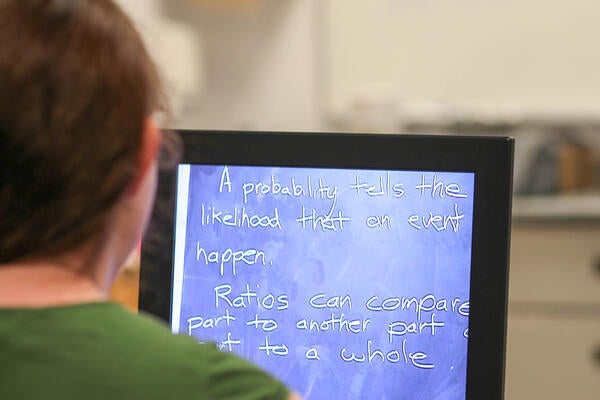
Social media and our quarantine life
How to use social media effectively during a pandemic and spotting fake news stories about COVID-19

How to use social media effectively during a pandemic and spotting fake news stories about COVID-19
By Angelica Sanchez University RelationsIn response to COVID-19, many in our community strive to adjust to the new reality of being at home. Entire offices and departments are now working from home and students have transitioned to online learning by using remote learning programs — all while staying connected with friends and families through video call sessions. We are all more digitally connected than ever before.
Shana MacDonald is a Waterloo professor and expert in the relationship between technology and public discourse. On Wednesday, May 20, she joined us for this week’s Ask our Experts community talk to share her tips on everything from which apps are best to keep kids learning while at home to how to spot fake news stories about COVID-19 on our social media feeds.
“COVID-19 is being described as the first global pandemic in the digital era,” MacDonald says. “But there is the good, the bad and the ugly … we rely on social media a lot in different ways.”
MacDonald explains the positive and negative outcome of using social media platforms and being online during a pandemic. In a positive light, people are fostering online communities for crowdsourcing and providing financial assistance to those in need. Social media is creating dialogue where people are sharing their experiences with each other as a coping mechanism.
Unfortunately, social media can also shape the way we receive information about COVID-19. The spread of misinformation is circulating at a rapid rate causing increased anxiety and fear for many people. However, we can stop the spread of misinformation by using fact checkers to verify news sources.
As families become more digitally connected, MacDonald offers a few recommendations for social media use in quarantine.
“Stranger danger” talk with kids
There remain lot of concerns about social media now that we are all online. An increasing number of online child predators during a pandemic should have parents assessing the quality content that their kids are consuming.
“It’s important to talk to our kids about stranger danger,” MacDonald says. Although parents can continue to monitor their kids’ screen use, she recommends having an open dialogue with our children and teenagers about being responsible and setting digital boundaries.
A need for balance
Having our calendars filled with virtual meetings can be draining, on top of the work we already perform online, it can take a toll on our health. She recommends balancing online time from offline time by planning activities to do with the family.
Offering movie nights, family zoom time or even playing video games together — McDonald does not consider these as screen time, instead as family time activities.
Avoid the spread of misinformation about COVID-19
“The thing about social media is that easily digestible sound bites can be turned into viral information … even though it can be incorrect information,” MacDonald says.
She explains that big technology companies must take responsibility for ensuring that misinformation is not being circulated. As individuals, we can be critical consumers of media by verifying information through a fact checker. After verification, we can then share the information on our social media platforms to counteract the fake news stories that are circulating online.
Here are some resources MacDonald recommends to spot fake news and fact check information:
• Fact check organization website
• International Federation of Library Associations and Institutions
Next week, our Waterloo expert will be James Thompson from the School of Accounting and Finance. Many people are wondering how the shut-down of our economy will affect their long-term financial goals. Should we still be paying into our RRSPs? How do workers who are close to retirement adjust to this new world?
On Wednesday, May 27 at noon, Thompson will discuss retirement planning in the time of COVID-19 and answer your questions about personal finance.

Read more
How a new COVID-19 screening tool can be used to identify older adults at risk

Read more
How to manage stress and anxiety during the COVID-19 pandemic

Read more
Despite the pandemic, Waterloo’s Centre for Sight Enhancement continues low vision support
The University of Waterloo acknowledges that much of our work takes place on the traditional territory of the Neutral, Anishinaabeg, and Haudenosaunee peoples. Our main campus is situated on the Haldimand Tract, the land granted to the Six Nations that includes six miles on each side of the Grand River. Our active work toward reconciliation takes place across our campuses through research, learning, teaching, and community building, and is co-ordinated within the Office of Indigenous Relations.